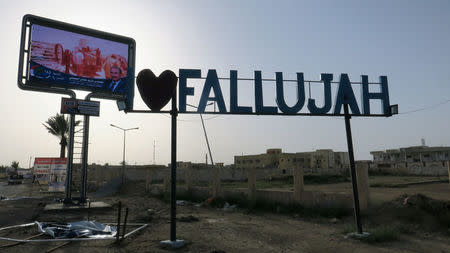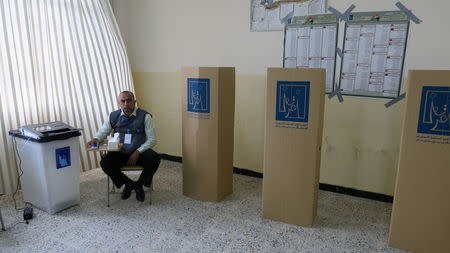As Iraq moves on with vote, Falluja trapped by sins of the past
By Ahmed Aboulenein
FALLUJA, Iraq (Reuters) - Braving a nationwide driving ban, hundreds of Iraqis walked through Falluja and stepped over barbed wire surrounding a school to vote in a parliamentary election they hope will help a city far from recovering from years of conflict and upheaval.
For them the election is not merely the first since the Islamic State militants who seized their city four years ago were defeated. Falluja's suffering is multi-layered.
It is also the first vote since U.S. troops who invaded Iraq in 2003 and pulverised much of their city in an offensive against insurgents left the country in 2011.
But casting a ballot for a parliament that will choose a prime minister presented its own challenges.
At least 80 voters in the Falluja Model Middle School for Boys, which was recently rebuilt after being levelled to the ground by U.S.-led coalition air strikes on Islamic State militants, were told they could not vote because they had the wrong type of voting cards, poll workers said.
Technical issues resulting from the introduction of a new electronic voting system soured the election in Falluja.
Some had incorrect information on their cards, or were directed to the wrong polling station.
Despite evidence to the contrary, many believe that the obstacles were put up to prevent Falluja's Sunni population from voting, underscoring the sectarian tensions Iraq still grapples with 15 years after a U.S.-led invasion toppled Saddam Hussein.
Iraq's minority Sunnis dominated Iraq under his rule. Shi'ites have run the country since his demise.
If Iraqis do not heal their deep rifts, the country which suffered from a sectarian civil war in 2006-2007, could spiral into more violence.
"The machines are not working. Many cards are rejected. This was done on purpose. For obvious reasons, for reasons you know very well," said Ibrahim Suliman, the school's principal who was acting as assistant station manager on Saturday.
Sunnis have long complained about rampant discrimination at the hands of the Shi'ite-led government, though some concede there have been improvements under Prime Minister Haider al-Abadi.
Falluja was the first city captured by Islamic State in Iraq, in January 2014, and a bastion of the anti-U.S. insurgency.
It is the most populous city in Anbar, the overwhelmingly Sunni western province that borders Syria, Jordan and Saudi Arabia.
RITUAL HUMILIATION
Rubble litters every street in Falluja. It was once known as the city of mosques, but much of the city was levelled and it is far from recovery.
Shi'ite militias man checkpoints inside and around the city, subjecting its Sunnis to what they allege is ritual humiliation.
"Sunnis are treated as third class citizens in Iraq. I can't go to Baghdad at night," said Abdul Salam al-Anzi, referring to what he said was mistreatment faced by Sunnis at checkpoints.
Speaking outside a polling station in Falluja, Anzi said he had voted for a candidate because he came from the same tribe, illustrating the factionalism that often undermines attempts at unity.
He, like many Sunnis, believe it is better if Abadi wins a second term rather than his challengers. Abadi's predecessor Nuri al-Maliki who was accused of pursuing a sectarian agenda while in office.
The third contender, Hadi al-Amiri heads the Badr Organisation which helped defeat Islamic State. His close ties to Shi'ite Iran has made many Sunnis resentful.
Like all voters Reuters spoke to on Saturday, however, Anzi was not convinced enough to vote for Abadi's list, the first in Iraq's history to run in all 18 provinces.
Civil servant Saddam Jabber had a candidate he enthusiastically supported, but was unable to vote for him because of technical issues.
"They took away my right to vote. If there is a problem, they should solve it, manually or otherwise," said Jabber, 42.
He wants Anbar and other provinces to create a Sunni region in Iraq akin to semi-autonomous Kurdistan.
"We have to become a region, to rule ourselves, as part of a federal Iraq," he said.
SADDAM'S SPECTRE
On Saturday morning, campaign posters were plastered everywhere in the Falluja, which has been ravaged by coalition air strikes on Islamic State, including on destroyed buildings.
Half an hour before polls closed, most posters were being taken down so their structures could be sold for scrap. People were wandering around asking strangers where they can vote.
Turnout at three voting centres visited by Reuters was below 30 percent by the time polls closed.
Nejm Abdullah, 30, owns a supermarket right outside a polling station he is registered at but would not make the short trip, saying his vote would not reform Iraq's political elites.
"It's like going to the tailor and ordering a dishdasha with certain measurements. The tailor does what he wants anyway," he said.
Like others, he is nostalgic for the past, when Falluja backed Saddam.
"Everything was better under Saddam; security, electricity. God rest his soul," he said.
Nuria Sabbar agrees. She has been displaced three times in the past 15 years; during the U.S. invasion, the subsequent civil war, and the Islamic State takeover.
"Falluja has not changed for 15 years; how can it change in the middle of all this war and sectarianism? At least under Saddam we had security," she said.
Even those who voted were sceptical.
"The coming government will be even worse than all the previous ones, mark my words. At this point we should erect a massive statue of Saddam and worship at its feet," said Hadi Abdullah, 60, a law professor.
(Reporting by Ahmed Aboulenein; additional reporting by Kamal Namaa; editing by Michael Georgy and Angus MacSwan)




